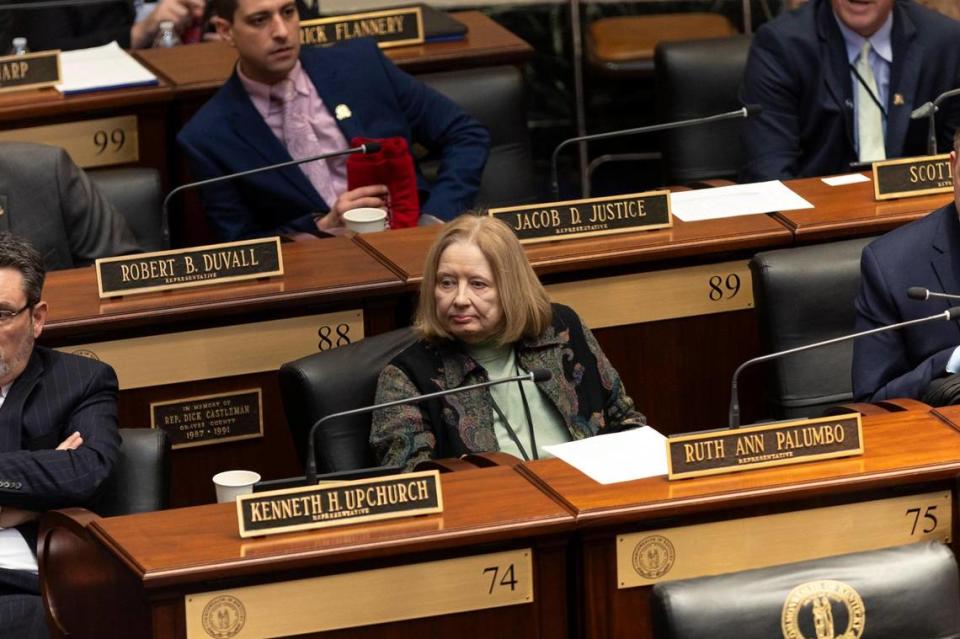Why are KY legislators fleeing Frankfort? Blame Trump, low pay and nasty politics
- Oops!Something went wrong.Please try again later.
- Oops!Something went wrong.Please try again later.
- Oops!Something went wrong.Please try again later.
- Oops!Something went wrong.Please try again later.
- Oops!Something went wrong.Please try again later.
Sen. Whitney Westerfield used to be the only one who could get his young daughter, Hadley, to go to sleep.
“When she was little, I was the only one,” he said. “Hadley (now nine years old) would always go to sleep for me; I could always get her to nap. Now, that has changed to be my wife because she’s the one who for a quarter-of-the-year has to try to get her to sleep.”
For a few months out of each of the past 12 years, Westerfield has spent most of his time in Frankfort, a three-hour drive from his home in Christian County.
“There’s not a day when I’m putting her to bed, that I don’t regret that – not because she favors my wife for that, but just because I’ve lost that time.”
Sign up for our Bluegrass Politics Newsletter
A must-read newsletter for political junkies across the Bluegrass State with reporting and analysis from the Lexington Herald-Leader. Never miss a story! Sign up for our Bluegrass Politics newsletter to connect with our reporting team and get behind-the-scenes insights, plus previews of the biggest stories.
Now, Westerfield has another three kids on the way, announcing recently he and his wife Amanda are expecting triplets.
That’s a big part of why Westerfield, a Republican first elected to the Senate in 2012, is one of 17 senators and representatives not seeking reelection this year. And the numbers are growing relative to years past.
Virtually all of the elected officials in Frankfort will tell you that serving in the Kentucky General Assembly is an honor and a privilege. But is it a good job?
“There is a level of prestige to these jobs, there’s no doubt,” said Senate Majority Floor Leader Damon Thayer, R-Georgetown, who was first elected in 2002.
“However, they were never really designed to be ‘good jobs.’ They’re a privilege to do and an honor to do, but they aren’t good jobs, especially if you do them right.”
According to the research of Arkansas State University political science professor Jordan Butcher, Kentucky had the sixth-lowest turnover rate in the nation for the time period 2002-2018. The commonwealth averaged about 8.74% turnover per year between the two legislative chambers each year during that period – less than 10% in the 100-member House and below 7% in the 38-member Senate.
In the past two complete election cycles since then, 2019-2020 and 2021-2022, the state House and state Senate averaged 12% and almost 10% (9.85%) turnover rates.
The average turnover rate between the chambers, weighing the Senate and House equally, rose from 8.5% in 2002-2018 to 10.9% from 2019-2022.
This trend could have material implications for Kentucky policy, Butcher said.
“When we’re cycling people through, we’re losing a lot of that important institutional knowledge. And when we have low expectations of staying long-term, it also means that we’re not so willing to play nice and work across the aisle,” she said.
“You’re also not as likely to create long-term policy. You’re creating quick policy that the next group has to figure out maybe how to fund or how to maintain infrastructure, because that’s going to be ‘their problem.’”

Why are Kentucky’s turnover numbers increasing?
Low pay, as well as concerns about the work environment with increased political vitriol, stood out among the many reasons that outgoing Kentucky state Senators and Representatives say they decided to leave their posts.
Environment and impact
There is some bipartisan agreement that legislating in the state is less fun and more tense.
That’s the diagnosis of Gov. Andy Beshear, at least.
He said he sees more partisanship, negativity and toxicity among legislators – with a reference to an alleged threat made by a House committee chairman to enact bridge tolls in the area of Republicans who disagreed with leadership – than when his father, Steve Beshear, was governor from 2007-2015.
“We need to tone down the rhetoric, tone down the attacks. There shouldn’t be threats of doing something to your area if you disagree with something that the rest of your party is pushing. That just shouldn’t be the way we act,” Beshear said at a press conference.
Some of those tensions within the Republican caucus, in particular, are starting to weigh on members.
Adam Koenig, a former GOP legislator from Northern Kentucky, said a “new crowd” of Republican legislators more interested in posturing than governing make Frankfort a worse work environment.
Koenig served for 16 years, first gaining office in 2006. He lost to a GOP primary opponent who ran to his political right in 2022.
“I hear both legislators and lobbyists say the same thing, which is, ‘It’s not fun anymore,’” Koenig said.
“The new crowd, which is, ‘Burn the place down, I’m coming with gasoline and a lighter,’ makes it hard to accomplish anything. Most people go down there to accomplish things, but now we’ve got an increasingly large group of people there who are just there to burn the place down.”
Koenig didn’t name names, but he said the problem is that more members have adopted the abrasive style of former Republican president and current 2024 GOP front-runner, Donald Trump.
He said that too much effort is spent “placating” the more Trump-like wing of the party.
“You can’t make things happen, you can’t pass your priorities without trying to placate people. Folks in membership are incentivized to take care of so many people,” Koenig said.
“The fact of the matter is that there are 60-65 good ol’ fashioned Reagan Republicans in the House, and that’s who I would love to see leadership pay attention to.”
It’s also a little harder for Republicans to trust each other.
Westerfield also referenced the Trump-influenced political atmosphere, adding that such partisan national media outlets as Fox News and MSNBC, as well as social media, has elevated the anger.
‘The partisanship outside is affecting the rhetoric inside” Frankfort, he said.
“You know, we weren’t talking about gender issues or trans issues five years ago. We were focused on pensions… We keep engaging more in culture war things, and I think that’s counterproductive. It gives us a lot to campaign on, but I think it’s counterproductive,” Westerfield said.
Rep. Kevin Bratcher, R-Louisville, is leaving to run for Louisville Metro Council after serving since 1997.
The Republican House caucus has changed a lot in the 27 years since – going from 36 members to 80 – but he doesn’t quite agree with Koenig’s assessment.
He says it’s not “less fun,” but it is different than when Republicans were in the minority or ticking off a checklist of long-desired “low-hanging fruit” conservative policies like “right to work” legislation.
He sees the fact that the Republican caucus hasn’t experienced a major rift yet as a feat of House GOP leadership.

“I think it’s a tribute to our leadership in the House that we haven’t had it as bad as some states. You look at Texas and Oklahoma, they have some serious Republican infighting going on. We have our share of disagreements, but there haven’t been any major breakaways,” Bratcher said.
“And I hope that never happens, but I wouldn’t be surprised.”
Democrats dwindling?
For all the internecine conflict among Republicans, Democrats have the opposite issue: Their numbers are so small that some members feel like they can’t get much done.
While some argue that pieces of their legislation, which they introduced first, often end up influencing GOP-sponsored bills that become law, Republicans have all but shut out Democrats from being primary sponsors on bills.
Despite making up around 20% of the Senate and House chambers, Democrats were primary sponsors on less than 2% of all bills that passed into law last year.
Of 190 House bills that became law in the 2023 session, only two had Democratic primary sponsors. Four Senate bills of 134 that ended up becoming law had Democratic primary sponsors.
Democrats file plenty of bills, but Republican leadership – which largely controls the flow of legislation – only lets a trickle flow through the legislative process.
Meanwhile, Republicans have passed sweeping changes to make Kentucky more fiscally and socially conservative since taking the majority in 2016, the first time in nearly a century.
They passed right-to-work legislation, banned almost all abortions, set the state on a path to cut the income tax to zero and recently passed a law that LGBTQ rights advocates call one of the most “anti-trans” laws in the country.
This has exhausted Rep. Josie Raymond, D-Louisville.
“I tell people, ‘In my time in Frankfort, the Democratic caucus shrunk from 39 to 20 and we banned abortion.’ So, I didn’t have a great time,” Raymond, who’s been serving her district running along Louisville’s Bardstown Road since 2019, said.
Now she’s running for an open Louisville Metro Council seat, where she says she has a greater opportunity to enact such progressive priorities as Universal Pre-K, affordable housing and curbing gun violence.
The Louisville legislator also was one of the most vocal opponents of Senate Bill 150, a bill that among other things banned gender-affirming care for transgender minors in Kentucky. That’s made the Capitol a less appealing workplace for her, Raymond said.
“In my experience, if you stand up for trans kids’ lives there are certain members of the Republican majority who won’t get on the elevator with you. That makes for a very hostile workplace.”

Only three of the 20 current Democratic House members have served in the majority – the Democrats held the majority for almost a century before the House became the last legislative chamber in the American South to flip red – and two of them are not seeking re-election.
Five of the House’s 20 Democrats are not seeking re-election.
Raymond joins Rep. Keturah Herron, D-Louisville, in leaving to run for another office, as Herron is the only person who filed to replace outgoing Democratic Senator Denise Harper Angel, D-Louisville.
Reps. Rachel Roberts of Newport, Derrick Graham of Frankfort and Ruth Ann Palumbo of Lexington are leaving Frankfort without an immediate plan to run for something else.
House Democrats have opted not to run for re-election at a much higher rate this cycle than House Republicans, as only eight of the once-80-member caucus chose not to run again.
In the Senate however, the rate of members choosing not to run for re-election is about the same between the two parties this cycle — one of five Democrats up for re-election and three of 14 Republicans up for re-election.
The five departing House Democrats have a collective 65 years of legislative experience, padded by Palumbo and Graham’s long careers. The 15 running for re-election have a collective 52 years of Frankfort experience under their belts.
But Democrats can still find some measure of success in Frankfort. Palumbo was one of two House Democrats to see a bill they sponsored make it into law last year.
Her 2023 bill mandating school districts keep a portable automated external defibrillator (A.E.D.) in every middle and high school building and at school-sponsored events did not receive a single “no” vote on its way to final passage.
Finding success, she said, is to work with Republicans on finding an issue that they can get behind. In her bill’s case, the key piece was the backing of House Health Services Committee Chair Kim Moser, R-Taylor Mill.
“I would say to (new Democratic legislators) ‘Be true to yourself. Stand up for what you believe, but work with the other party. Listen to people who don’t agree with you and learn from them,’” Palumbo said.

She said a keen eye for bipartisanship is one of the reasons she’s one of the longest-serving women in the history of the state legislature, first claiming the 76th House District in 1990 when there were 68 Democrats in the House.
However, she said that Republicans’ recent penchant for “hateful with a capital ‘H,’” legislation has made it more difficult for her peers of late.
Palumbo said she’s leaving after this session because she believes her son, Jamie, who is running in a competitive Democratic primary to replace her, is “ready to step into the job.”
Over in the Senate, Democrats and Republicans alike claim that they’ve tried to keep the “upper” chamber more cordial than the House.
In early January, a newer Louisville Democrat scored a bipartisan victory, gaining significant Republican support for her bill to exempt diapers from the state’s sales tax.
Sen. Cassie Chambers Armstrong, D-Louisville, underwent the opposite transition that Raymond and Bratcher are looking to make. She moved from Louisville Metro Council to Frankfort.
“I love being here. I’ve found everyone to be very welcoming, and I’ve found it to be a very collegial place,” Chambers Armstrong said.

It’s important to note the House and Senate vary in character – the House moving faster and with more varying priorities than the smaller, traditionally more deliberative Senate.
For Chambers Armstrong and Senate President Robert Stivers, R-Manchester, that makes the Senate somewhat more insulated from “outside influences.”
“I really do think the Senate Democrats and the Senate Republicans have a really good working relationship – very open, very honest with each other. I think outside influences, there’s what we call the ‘left wing nuts’ and ‘the right wing nuts,’ sometimes get hard to deal with,” Stivers said.
“But I think there’s really good relationships among the legislators in the Senate.”
Logistics & pay
During the 2022 legislative session, Rep. Raymond went against the vast majority of her party to side with House Republicans on a vote – not a common occurrence for the strong progressive known for her stark criticism of Republicans in floor speeches.
It was to approve the legislative branch budget, which included a proposed raise for legislators as well as legislative staff.
While many Democrats, including Gov. Andy Beshear, railed against the majority-Republican legislature approving a raise for those continuing to serve in the body, Raymond saw a need to better compensate legislators.
“The pay structure and the schedule are particularly difficult for people raising young children,” said Raymond, who has three young kids.
Kentucky lawmakers recently took home an average of about $65,000 in a long session year. Lawmakers who have been re-elected since the 2022 passage of an 8% legislator pay raise can expect to see that number rise this year.
However, total pay can vary greatly, and during session legislators that aren’t in leadership make $203 per day, a figure relatively small compared to many private sector opportunities.
Legislators also receive $183 per day for expenses.
Butcher, the political scientist specializing in research of state legislatures, said that relatively low pay in general is a major driver of turnover in statehouses across the nation.
“When we see politicians in Congress, a lot of them are independently wealthy. A lot of them have made their own money, and they they just kind of live a different lifestyle than you and I. But that’s not really the case in our state legislatures,” Butcher said.
That can limit the scope of who even decides to “apply” for the job and run in the first place, Westerfield said.
“Right now, the job only appeals to people who are either independently wealthy, retired or super ambitious,” he said. “I fall into the latter category, or at least I did 11 years ago. I have and had aspirations for higher office and serving in the state legislature was a huge opportunity.”
Raymond said that she hasn’t been able to secure full-time employment since 2020, but not for lack of trying. Currently, she consults for nonprofits and works as a substitute teacher to supplement her income.
But she said she hopes to find outside full-time employment as a member of Louisville Metro Council, where members make about $54,000 per year.
Butcher said that lifestyle pressures to leave or not run for office in the first place often hit women the hardest. The vitriol from outside can come down stronger on them as well, necessitating the need for bipartisan legislative womens’ caucuses.
Butcher’s research shows that states with such caucuses are more likely to retain women legislators.
“Women tend to take on more of the hate up front: They’re more likely to get harassing phone calls, they’re more likely to be judged by their male colleagues. So, having a supportive environment of other women is really beneficial,” Butcher said.
A perk to local government, at least in the state’s two biggest cities, is that council members in Lexington and Louisville get dedicated staffers. That’s not the case for all 138 members of the state legislature.
While the Legislative Research Commission boasts 543 staff that support the General Assembly, partisan permanent staff dedicated to helping just the members of their own caucuses total 65.

During an interview in sight of the Capital Avenue bridge, Stivers, a 62-year-old legislator who has served his Eastern Kentucky district since 1996, said legislators should consider throwing in the towel when Frankfort no longer feels so special.
“Sometimes you just lose the twinkle in your eye,” he said.
“You see that bridge over there? When you turn and go across that bridge, and you see that Capitol and it doesn’t have you in a certain state of awe, then maybe it’s time to go home. It’s an unreal venue to be working in, and it’s just a tremendous responsibility.”
But, he added: “It can wear on you over a long period of time.”

